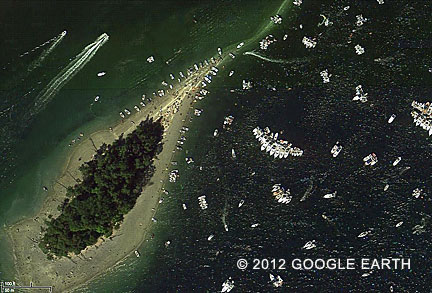human interference
Grim holidays - two dead sea lions in West Seattle
Jan/03/20 02:45 PM
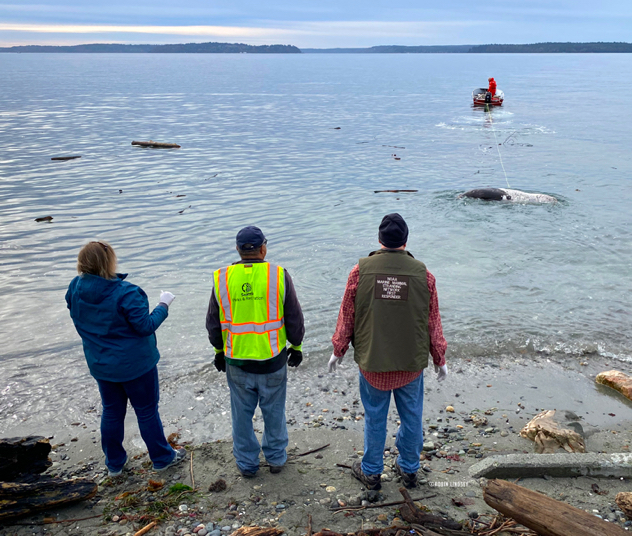 On Christmas Day, a partially decomposed California sea lion washed ashore on a private West Seattle beach. Before a necropsy could be arranged, the animal was swept back into Puget Sound. It drifted along the shoreline for days until it finally landed 12 miles north at Constellation Park on New Year’s Eve.
On Christmas Day, a partially decomposed California sea lion washed ashore on a private West Seattle beach. Before a necropsy could be arranged, the animal was swept back into Puget Sound. It drifted along the shoreline for days until it finally landed 12 miles north at Constellation Park on New Year’s Eve.Seal Sitters MMSN First Responder David Hutchinson coordinated with Seattle Parks who agreed to dispose of the carcass so that a limited necropsy could be done on animal. Orca Researcher Mark Sears offered to tow the carcass to Don Armeni boat ramp since no disposal was possible on the public beach. Casey McLean of SR3 performed the necropsy today with the assistance of SS First Responder David Delgado, removing the head for radiographs to try to determine if the animal had been shot.
A second sea lion which stranded dead on November 25 had already been confirmed dead by gunshot. A huge projectile was removed from the body, having done significant internal damage to organs and bone.
Results from today’s necropsy will be posted on this blog when the X-rays have been completed.
UPDATE 1/9/20
Radiographs have revealed projectiles in the head of the Christmas Day sea lion. Fragments from the skull will be turned over as evidence to NOAA Office of Law Enforcement.
Snapper taken to rehab as options dwindle for struggling pups
Aug/07/13 10:05 AM
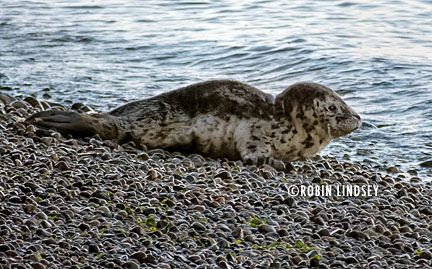
Yes, this is a Seattle public beach (and, therefore, dogs are NOT allowed), but it is also a beach that wildlife has a right to use, too. This exhausted, emaciated pup desperately needed a place to rest and it is hardly unreasonable to ask someone to go a few yards out of their way to help a wild animal survive. Not to mention, the Marine Mammal Protection Act protects these animals by law. Having already rescued a newborn pup early that morning because of human harassment resulting in abandonment, our responder was in no mood to have this struggling pup harassed as well.
Volunteers watched over the pup until dark, who spent the night on the beach and returned to the Sound about 8am Tuesday (see photo). Later in the day, we received a call from NOAA that a listless pup was at Cormorant Cove. The male pup, nicknamed Snapper and weighing just 8.8 kgs, was taken from the beach to PAWS Wildfife Center and is confirmed by spot identification to be the same Lincoln Park pup.
It is unfortunate to have to report that all of the spaces for rehabilitation are now full - almost all of the seal pups at PAWS had to be taken there because of human interference. This means that there are no options for helping seal pups for possibly up to two months - seal pup rehab is challenging, lengthy and expensive. NOAA wants these few spots reserved for animals that have been victims of human interaction - whether fishing gear injuries, illegal removal from a beach, causing abandonment by a seal mom, etc. If there were fewer cases of human interference, we would have more options to help other emaciated seal pups like Snapper.
STAY AWAY FROM RESTING SEAL PUPS! Yesterday, an abandoned pup had to be relocated from a small island to a nearby harbor seal rookery in hopes another nursing mom will adopt him. When the biologist arrived on Cutts Island, there was a family sun-bathing within feet of the tiny, skinny pup. Is it any wonder mom did not return when this island’s small seal colony is continually harassed by boaters who party within feet of them?
PUPDATE:
8/7/13
Sparkle, the newborn pup abandoned near Alki Beach due to harassment, is stabilized at PAWS and was outside in a pool yesterday morning. Snapper had an infected wound on his flipper (being treated by antibiotics), but thus far his most daunting battle is recovering from being so underweight.
9/9/13
We are so sad to report that Sparkle was euthanized at PAWS on September 9th. Veterinarian Dr. John Huckabee believes Sparkle’s immune system was not functioning properly, as she struggled the entire time she was there with digestive issues, ear and other infections and a heart murmur.
Seal pup Sparkle, victim of human interference, taken to rehab
Aug/05/13 06:01 PM
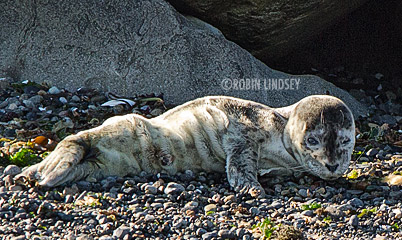
First responders David and Eilene kept watch through their scope last evening, trying to determine if mom might return to nurse her pup, but Sparkle was still alone at 9pm. They saw her leave the raft and, luckily, a neighbor noticed the pup come ashore on the private beach, quickly alerting our volunteers. Under cover of darkness and incoming tide, the pup would be relatively safe for the night. At 5am, lead investigator Robin found Sparkle sound asleep in the same spot and began the process of arranging her rescue - a call to PAWS to ensure they had space, emailing health assessment photos to WDFW’s Dyanna Lambourn for consult and lining up volunteers Lynn and Lars to assist in the capture.
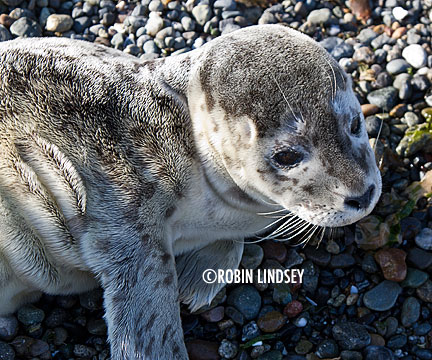
Thankfully, the pup came ashore and we were able to capture and transport her. There is no guarantee the emaciated pup will survive - and because of people’s insensitivity and carelessness, even after months of fattening up in rehab, Sparkle will not have learned valuable life lessons from mom, such as how to forage successfully and interact with other seals.
PUPDATE 7:30pm
PAWS confirms that Sparkle is female and weighs a mere 6.6 kg. Despite a bloody umbilicus there appears to be no infection, but she has multiple punctures on her hind flippers. We will keep you updated about Sparkle’s progress.
9/9/13
Sparkle was euthanized at PAWS this morning. Veterinarian Dr. John Huckabee believes Sparkle’s immune system was not functioning properly, as she struggled the entire time she was there with digestive issues, ear and other infections and a heart murmur.
Boat harassment endangers life of newborn seal pup - stay back!
Aug/04/13 07:43 AM
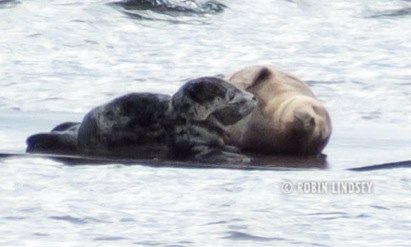
What we’re certain of now, however, is that the pup is between 4-10 days old. Based on our photo obtained yesterday, showing a shred of umbilicus still attached, WDFW’s marine mammal biologist estimated the age is closer to 4 days. Because of the high disturbance yesterday of racing outrigger canoes and boat traffic, the adults quickly abandoned the platform yesterday morning, leaving newborn Sparkle and a larger yearling as the sole occupants. The adults never returned and as of late last night, the platform was empty.
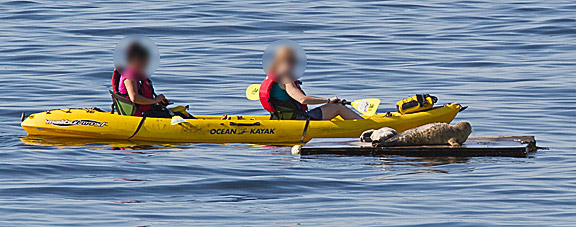 Throughout the day, a steady stream of kayakers and boaters came way too close to the platform, some within only a few yards - harassment in the eyes of NOAA Office for Law Enforcement (OLE) and a violation of the Marine Mammal Protection Act. Stay back from all resting seals, whether on rafts, docks, buoys or shore. Incidents (such as the one shown of two kayakers) are being documented and photographic evidence of violations will be sent to OLE for investigation. Violations are punishable by fine and severe violations are punishable by jail time. Read more about boater guidelines here.
Throughout the day, a steady stream of kayakers and boaters came way too close to the platform, some within only a few yards - harassment in the eyes of NOAA Office for Law Enforcement (OLE) and a violation of the Marine Mammal Protection Act. Stay back from all resting seals, whether on rafts, docks, buoys or shore. Incidents (such as the one shown of two kayakers) are being documented and photographic evidence of violations will be sent to OLE for investigation. Violations are punishable by fine and severe violations are punishable by jail time. Read more about boater guidelines here.What’s all the fuss? Adult harbor seals have learned of the dangers of humans and dogs and are very wary of disturbance. If there is too much activity around a mom’s pup, she may flee the area and abandon him. Because of the constant activity around the platform, this tiny pup who cannot survive on his own, may have been given a death sentence by boaters who insisted on coming too close - potentially permanently scaring the mom away. Human interference has dire consequences for seal pups, often resulting in death.
We want the seals to be able to depend on use of this lone platform (until recently, there were two more providing sanctuary at this location) to rest and regulate their body temperature. Undisrupted, stress-free rest is critical to their survival. If they are chased from this safe refuge, they must turn to the beach - with the dangers of off leash dogs and unwitting beach-goers. This tiny pup would be helpless alone on the beach without a mother’s protection. Please respect seals’ space and stay back 100 yards whenever possible. This also includes people observing the platform from shore - please watch from a distance and not directly across from the seals which causes undue stress. If you’d like information on building an off shore platform to help wildlife survive, please contact us.
Seal pups in a daily struggle to survive - please give them space
Jul/26/13 08:20 AM
UPDATE 7/26 3:45pm
The Olympia pup, positively identified, is not in danger, but instead is a healthy-looking weaned pup exhibiting normal behavior. The report of a “starving...abandoned” pup caused a media flurry and demands of rescue from the public, but the pup in question was observed today sneaking a bit of milk from a female nursing her own offspring. Often, a pup will call out with a plaintive “maaaaaaaa” even after weaning, seeking an easier meal from a female’s nipple than searching for tiny fish in the waters of Puget Sound. This pup should and will stay in the wild - like all pups whenever possible. (note: Adding to confusion, video footage widely shown by one Seattle tv station is of a nursing age pup - not the one originally reported to authorities and photographed by The Olympian)
In the first year of life, a harbor seal pup is in a constant struggle to survive. With a 50% mortality rate in the wild, they must overcome many challenges: disease, infection, predation by shoreline predators or domestic dogs, conditions caused by premature birth, dehydration and starvation. This is, unfortunately, a fact of life - and death.
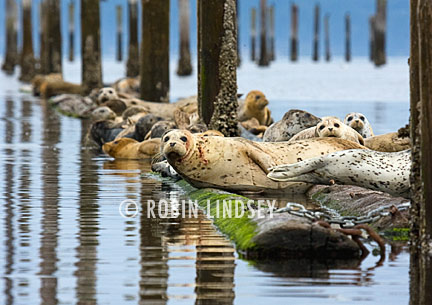 The current media coverage and resultant firestorm to rescue a “starving” seal pup in the Olympia area has overlooked some very important points. First of all, the pup is in a protected harbor seal haul-out and rookery. Each year, seals use a log boom in this bay to give birth and nurse their young (photo at left). Yesterday’s seal count at this thriving rookery, including logs just to the south, was 245 seals, of which 75 were pups. And each year at this rookery, between 5 and 20 pups die during pupping season, late June through September. In a nearby rookery, 30-60 pups die. The mortality rate at this rookery may be lower because it is indeed situated on the log boom, and much easier for seals to escape disturbance from eagles and coyotes (and boaters) because they are able to slip off into the water for protection. A number of pups may die and disappear into the water so are unaccounted for. This is the harsh reality of life for wild animals. Not every one survives nor should every one be rescued.
The current media coverage and resultant firestorm to rescue a “starving” seal pup in the Olympia area has overlooked some very important points. First of all, the pup is in a protected harbor seal haul-out and rookery. Each year, seals use a log boom in this bay to give birth and nurse their young (photo at left). Yesterday’s seal count at this thriving rookery, including logs just to the south, was 245 seals, of which 75 were pups. And each year at this rookery, between 5 and 20 pups die during pupping season, late June through September. In a nearby rookery, 30-60 pups die. The mortality rate at this rookery may be lower because it is indeed situated on the log boom, and much easier for seals to escape disturbance from eagles and coyotes (and boaters) because they are able to slip off into the water for protection. A number of pups may die and disappear into the water so are unaccounted for. This is the harsh reality of life for wild animals. Not every one survives nor should every one be rescued.
There has been a public outcry that the “abandoned” pup must be taken for rehabilitation. However, this pup is known to have come and gone from the logs into the water multiple times. There are many, many seals nearby. It has been documented in this and other rookeries that females will sometimes adopt an abandoned pup, nursing two at once (they only give birth to one pup). The body weight of this pup suggests that he or she might be sneaking milk from another mom - a female will sometimes relent to a persistent “sneaker”. And the possibility is not entirely ruled out that the pup is being nursed at night.
Rehabilitation is not the answer for all seal pups. First of all, many of them will not survive the stress of being captured and transported by car or truck to an authorized facility hours away. We must weigh many issues before making a decision to remove a pup from the wild. Even if they are rehabilitated and released months later with a dense layer of blubber, that does not ensure they will thrive in the wild. They still have only a 50% chance of survival their first year. A pup that has not been taught to hunt by mom has much less chance to forage successfully. A study by Sea Doc Society revealed that rehabbed pups travel much farther in search of food than wild-weaned pups, wasting precious calories. A human tossing fish into a small pool does not replicate catching fast-swimming fish in expansive waters. Rehabilitation does not guarantee an animal’s survival post release. Additionally, Washington has no major marine mammal rehab facilities. There is extremely limited space for lengthy pup rehabilitation, so each decision to remove an animal from the wild is on a case by case basis taking into account numerous factors. Read NOAA’s policy on harbor seal pup rehabilitation here.
The question has been asked, “What is the harm in helping him?” In reality, there is much harm that can be done. We cannot jeopardize the health of the many pups at this or any rookery in hopes of saving one. This time of year in Puget Sound, pups are being born every single day. If humans intervene and disrupt the normal activity in these areas, other pups may well be abandoned and starve to death. Human disturbance has serious consequences.
Seal Sitters supports the decision not to intervene in this case - and there is the fervent hope that this pup will make it. Sadly, we can’t save all seal pups. And many would argue, it is not our place in nature to do so. It is heartbreaking for any member of the Marine Mammal Stranding Network to have to observe a struggling pup and respect nature’s role. We are passionate about keeping seal populations healthy and thriving - and do everything we can to give pups the space to get stress-free rest, away from human interference. Not every seal pup will survive this pupping season and we all share sadness in that hard fact - but know that there is a reason for this very fragile balance of nature.
Do not take matters into your own hands if you come across a pup - they are protected by Federal law. It is illegal to feed, touch or move a pup. If you break the law and take a pup to a wildlife facility, they cannot legally treat the animal. NOAA’s Office for Law Enforcement will investigate all instances of human interference. Call NOAA’s stranding hotline at 800-853-1964 to report a pup you are concerned about.
Please read NOAA’s most recent Q&A publication “Share the Shore with Harbor Seal Pups” here. The document describes the life processes of harbor seals, what to do if you come across a pup and NOAA’s policy on rehabilitation. Please do “Share the Shore” and observe these magnificent animals quietly from a distance.
Please note: The Olympian newspaper which originally broke the story of a “starving” pup has now updated their website with the news that the pup is indeed a healthy, weaner.
The Olympia pup, positively identified, is not in danger, but instead is a healthy-looking weaned pup exhibiting normal behavior. The report of a “starving...abandoned” pup caused a media flurry and demands of rescue from the public, but the pup in question was observed today sneaking a bit of milk from a female nursing her own offspring. Often, a pup will call out with a plaintive “maaaaaaaa” even after weaning, seeking an easier meal from a female’s nipple than searching for tiny fish in the waters of Puget Sound. This pup should and will stay in the wild - like all pups whenever possible. (note: Adding to confusion, video footage widely shown by one Seattle tv station is of a nursing age pup - not the one originally reported to authorities and photographed by The Olympian)
In the first year of life, a harbor seal pup is in a constant struggle to survive. With a 50% mortality rate in the wild, they must overcome many challenges: disease, infection, predation by shoreline predators or domestic dogs, conditions caused by premature birth, dehydration and starvation. This is, unfortunately, a fact of life - and death.

There has been a public outcry that the “abandoned” pup must be taken for rehabilitation. However, this pup is known to have come and gone from the logs into the water multiple times. There are many, many seals nearby. It has been documented in this and other rookeries that females will sometimes adopt an abandoned pup, nursing two at once (they only give birth to one pup). The body weight of this pup suggests that he or she might be sneaking milk from another mom - a female will sometimes relent to a persistent “sneaker”. And the possibility is not entirely ruled out that the pup is being nursed at night.
Rehabilitation is not the answer for all seal pups. First of all, many of them will not survive the stress of being captured and transported by car or truck to an authorized facility hours away. We must weigh many issues before making a decision to remove a pup from the wild. Even if they are rehabilitated and released months later with a dense layer of blubber, that does not ensure they will thrive in the wild. They still have only a 50% chance of survival their first year. A pup that has not been taught to hunt by mom has much less chance to forage successfully. A study by Sea Doc Society revealed that rehabbed pups travel much farther in search of food than wild-weaned pups, wasting precious calories. A human tossing fish into a small pool does not replicate catching fast-swimming fish in expansive waters. Rehabilitation does not guarantee an animal’s survival post release. Additionally, Washington has no major marine mammal rehab facilities. There is extremely limited space for lengthy pup rehabilitation, so each decision to remove an animal from the wild is on a case by case basis taking into account numerous factors. Read NOAA’s policy on harbor seal pup rehabilitation here.
The question has been asked, “What is the harm in helping him?” In reality, there is much harm that can be done. We cannot jeopardize the health of the many pups at this or any rookery in hopes of saving one. This time of year in Puget Sound, pups are being born every single day. If humans intervene and disrupt the normal activity in these areas, other pups may well be abandoned and starve to death. Human disturbance has serious consequences.
Seal Sitters supports the decision not to intervene in this case - and there is the fervent hope that this pup will make it. Sadly, we can’t save all seal pups. And many would argue, it is not our place in nature to do so. It is heartbreaking for any member of the Marine Mammal Stranding Network to have to observe a struggling pup and respect nature’s role. We are passionate about keeping seal populations healthy and thriving - and do everything we can to give pups the space to get stress-free rest, away from human interference. Not every seal pup will survive this pupping season and we all share sadness in that hard fact - but know that there is a reason for this very fragile balance of nature.
Do not take matters into your own hands if you come across a pup - they are protected by Federal law. It is illegal to feed, touch or move a pup. If you break the law and take a pup to a wildlife facility, they cannot legally treat the animal. NOAA’s Office for Law Enforcement will investigate all instances of human interference. Call NOAA’s stranding hotline at 800-853-1964 to report a pup you are concerned about.
Please read NOAA’s most recent Q&A publication “Share the Shore with Harbor Seal Pups” here. The document describes the life processes of harbor seals, what to do if you come across a pup and NOAA’s policy on rehabilitation. Please do “Share the Shore” and observe these magnificent animals quietly from a distance.
Please note: The Olympian newspaper which originally broke the story of a “starving” pup has now updated their website with the news that the pup is indeed a healthy, weaner.
Don't touch seal pups! Rash of illegal pickups endanger pups
Jul/14/13 07:12 AM
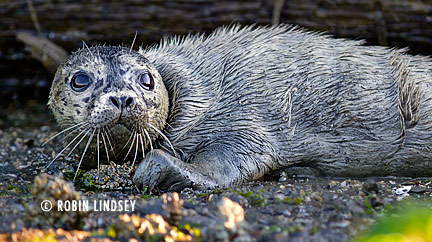
It is against Federal law, the Marine Mammal Protection Act, to touch, feed or move a seal pup. Violations are subject to stiff fines and can include jail time, depending on the severity of the crime.
One of the most common wrong assumptions that people make is thinking that a pup needs to be in the water, not on shore. Pups haul out to rest and warm up from our very frigid Northwest waters. Never return a pup to the water. They need to rest - on beaches, log booms, docks - even, occasionally, passing kayaks and paddle boards. Never cover a pup with a blanket - they can overheat and suffer brain damage.
During pupping season (June - September in South Puget Sound), it’s not unusual for a pup to suckle rocks or logs when mom isn’t around. The newborn pup shown here, with a long, white lanugo coat usually shed in the womb, was suckling on rocks and calling for mom, who returned to tend to her offspring. A newborn will still have a bit of the umbilicus cord protruding. It is not an “injury” as many people think and usually falls off after a week or so. If you see a pup you are concerned about, call the stranding network - don’t touch or try to feed the pup.
Share the shore. If you see a seal pup, stay back - 100 yards whenever possible. The best chance a pup has for survival is to stay in the wild, undisturbed by humans. If a pup is under 4-6 weeks old and is alone on the beach, almost always mom is nearby. If she sees people or dogs (a significant danger) too close, she may well abandon the pup who cannot survive without her. A pup taken to rehab does not have nearly the chance to make it back in the wild as a pup who remains there with mom, learning how to forage and gaining immunity from disease while nursing on her rich milk. Even then, pups have a 50% mortality rate their first year.
Never take a pup from the beach. Only members of NOAA’s Marine Mammal Stranding Network or NOAA authorized personnel can transport a marine mammal. A pup taken illegally from the beach to a wildlife facility, by law cannot be treated until approved by NOAA. While you may think you are saving a pup, instead you are gravely endangering him. Being removed from the beach, handled and put into a car can cause life threatening stress. Please don’t disturb resting seal pups. If you are concerned about the health of an animal or if there is harassment by people or dogs, call the NOAA hotline @ 800- 853-1964 or the Seal Sitters hotline @ 206-905-7325 (SEAL) and we will direct you to the proper standing network for response.
Fourth of July no picnic for wildlife - stay away from seal haulouts
Jul/03/15 12:52 PM
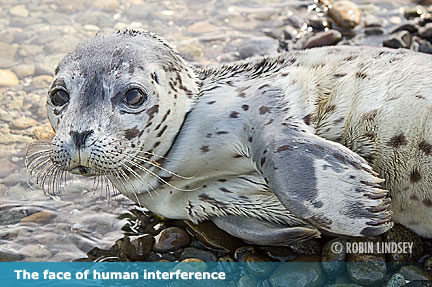
Harbor seal haulouts are full of pregnant females and newborn pups in South Puget Sound and pups can be found all along the Washington coastline and inland waterways. Harbor seals also use jetties, breakwaters and log booms for haulouts.
Please stay a minimum of 100 yards away from resting seals. Like all marine mammals, they are protected from harassment by the Marine Mammal Protection Act and Washington State law RCW 77.15.130 (a criminal misdemeanor, mandatory court appearance, punishable with up to 90 days in jail and up to $1000 fine).
Pups pay a terrible price for human disturbance. The pup shown above was found in 2012, starving on Cutts Island, along with two other emaciated pups and several dead ones. All had been abandoned by their mothers because boaters disrupted the seal colony on this small island near Gig Harbor. A day of boating fun for people can be a death sentence for seal pups. During boating season, thousands of boats can be moored offshore at Cutts disrupting this historic harbor seal haulout (called a “rookery” during pupping season). This past weekend, Boy Scout Troop 1519 along with WDFW staff posted warning signs on Cutts and surrounding beaches that seals are protected by Federal law and to stay back.
If you find a spot for your picnic on a beach near a harbor seal, please move your picnic to another beach. There are reports of people with blankets and coolers surrounding a lone seal pup - finally calling the stranding network wondering why the mother did not return. A harbor seal mom, shy and wary of humans, will abandon her pup if people and dogs are around! Use common sense and help protect wildlife from harassment.
If you are boating or kayaking, please stay far away from resting harbor seals. In 2010, we documented a speeding boat intentionally flushing seals from a protected island rookery with a sign posted “closed harbor”. In the photo below, you can see the boat scaring hundreds of seals from the beach, including pregnant females and many newborn pups. A female was giving birth right at that very moment and, terrified, she left her newborn pup, still in a bloody birth sac, alone on the deserted beach. The mom had no time to memorize the scent or call of her pup, which often leads to abandonment. Thankfully, a full 20 minutes after the boat left with the people onboard laughing, the mom returned to nurse her pup. More often than not, that pup would have been abandoned and slowly starved to death.
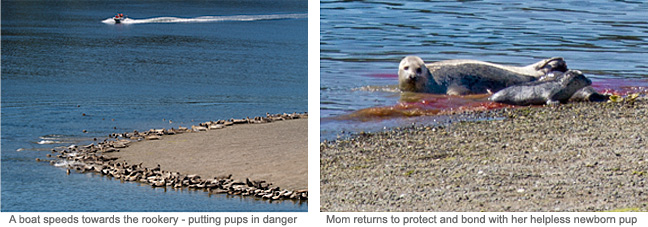
It is not a laughing matter to harass seals. It is a matter of life and death for seal pups. This incident was investigated by NOAA’s Office for Law Enforcement. Harassment is not just poking with sticks (yes, we have witnessed that) or scaring an animal back into the water - any change in an animal’s behavior caused by your presence is considered a “take” by law. This Federal law also prohibits touching, moving and feeding seal pups.
Many state parks on islands in the San Juans, Central and South Puget Sound have harbor seal rookeries. Do not approach animals by boat or by land. Please, be respectful and move your party elsewhere. If you see a violation, please call NOAA Office for Law Enforcement: 1-800-853-1964 and your local stranding network.
Boat launches and docks can have newborn or weaned pups sleeping on them or nearby, often in danger from propeller strikes or being run over by boat trailers. In some coastal areas, people are allowed to drive vehicles on the beach itself. On July 4th weekend in 2011, a pup was run over and killed on the beach at Ocean Shores - other animals, sick or weak and unable to move quickly, have been run over on beaches at Westport (California sea lion pup), Long Beach Peninsula (California sea lion), and Twin Harbors (adult harbor seal) at different times of the year. Please immediately report any pup (or adult) that is at a dangerous location or being harassed to your local stranding network.
Please be aware of your surroundings and give animals a break this holiday. Respect that harbor seals need to rest and nurse. Celebrate responsibly and you just might save the life of a seal pup. Fireworks are a moment’s thrill that can have heartbreaking consequences for wildlife.
Ruby the rehabbed seal enjoys safer shores of West Seattle
Jan/26/13 06:01 AM
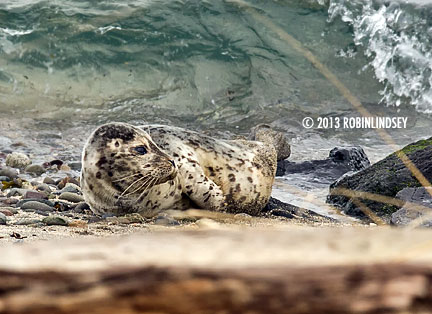
We have learned more about the human interference that landed her in PAWS rehab facility last July. According to WDFW Marine Mammal Investigations, over a period of several days, Ruby had been coming and going from the beach at a park near Steilacoom’s old Saltar Marina. There were reports of her being “poked with sticks” and people pouring water over her. Because she had been harassed by people and apparently abandoned, she was taken to PAWS.
Ruby was given a new lease on life by the wildlife center. Merely a week or so old, she was thin and weighed only 18 lbs. She had some breathing issues and was treated for lungworm. Under PAWS care, she grew into a true “blubberball”, weighing 59 lbs when released in October. Since Ruby was not taught foraging skills by her mom, she would need this fat layer to sustain her while she learned to hunt in the wild. Learning to catch fish in a small rehab pool is very different from catching fast, darting fish in the expanse of Puget Sound.
Ruby’s story drives home the message to STAY AWAY FROM SEAL PUPS. While we cannot say for sure the reason for her presence on shore, perhaps because of her breathing issues and the fact that she couldn’t swim for long periods of time, Ruby was left there while her mom foraged, fully intending to return to nurse her youngster. If a shy mother seal sees people and dogs around her pup, it is extremely likely she will not return. A pup’s best chance for a full and healthy life is always with the mother, learning the skills not only to survive, but to thrive. A rehab facility cannot substitute for a mother’s teachings. SeaDoc Society published some interesting findings from a study comparing the foraging habits of wild weaned seal pups versus rehabilitated pups. The study shows that rehabbed pups travel much longer distances foraging for food than pups raised in the wild. Read it here. Seal Sitters’ seal pup Sandy, rehabbed by PAWS, travelled extensively, too, in search of food only to end up dead, entangled in marine debris.
Seal Sitters hopes Ruby continues to remain in West Seattle where our astute community will make sure she is protected and able to rest undisturbed. If you see a seal pup with a red flipper tag (or, of course, any marine mammal on shore), make sure to call our hotline immediately @ 206-905-7325 (SEAL). We want precious little Ruby to know she is safe on our shores and hopes she packs on a little more blubber.
Rehabbed seal pup makes long journey to the big city
Jan/24/13 09:01 PM
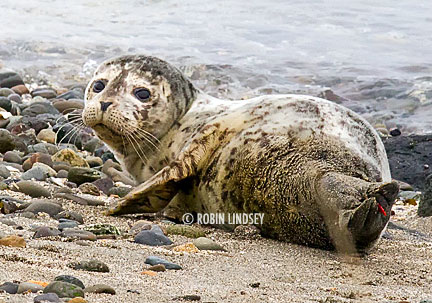
Examining the skittish pup for health issues through her telephoto lens, our responder noticed a red tag on the rear flipper which indicated the animal had been in a rehabilitation facility. Thankfully, before the tag got too covered in sand, we were able to get the numbers for identification. Kristin Wilkinson, NOAA’s marine mammal stranding expert, promptly responded to our inquiry about the pup’s history. The female pup was taken to PAWS Wildlife Center on July 30, 2012, rehabilitated and released at McNeil Island, south of Tacoma, on October 2nd.
What had caused the pup to be taken from the wild? Human interference. The pup had been trying to get some rest on a Steilacoom beach, not too far from several harbor seal rookeries. Only about a week or so old, the tiny pup, alone on shore, was continually “harassed” by people. Most times, a mom will take her pup with her while she forages; however, if the pup is not strong enough to swim for long periods (or has health issues) she will sometimes leave her pup, returning later to nurse. Quite possibly, the mom did not return because of all the human activity. Adult harbor seals are extremely shy and wary of people and will too often abandon their young under these circumstances.
Due to the illegal harassment, WDFW’s Marine Mammal Investigations Unit was forced to take the pup from the beach. Since she could not forage for herself and therefore was not a candidate for relocation to another area, she was taken to PAWS. Upon arrival at the Lynnwood facility, the little female was fluidated and stabilized. After several months of rehab, packing on blubber weight and learning to fish on her own, she was finally released back into the wild.
Seal Sitters is excited to have the opportunity to protect this jewel of a pup, nicknamed Ruby, who has travelled so far and faced such challenges. Under the watchful eye of our West Seattle community, she will get the rest she needs. Ruby returned to Elliott Bay mid-afternoon and has been spotted foraging offshore at Jack Block Park the past two days.
Please check back for additional details about the human interference and her subsequent treatment at PAWS as we gather more information. We had tentatively named the pup Gypsy because of her travels, before realizing we had a pup by that name in September of 2011, who, coincidentally, was also harassed by people.
Respect harbor seal haulouts - it's life and death for seal pups
Aug/12/12 08:58 PM
Boaters, kayakers and jet skiers: Please be aware that locations where harbor seals gather are sensitive and vital areas - and disturbances to seal colonies can be devastating for newborn pups. Many Puget Sound islands have state parks with seal haul outs, where the animals gather in numbers to rest and, this time of year, give birth and nurse their young. Adult harbor seals are extremely skittish and the slightest disturbance can cause a stampede into the water, often leaving vulnerable pups alone on shore. If people land watercraft or swim or picnic close to a pup, the mom may well abandon him. On a state park island last year, WDFW Marine Mammal Investigations’ biologist found a group of picnickers surrounding a pup and was told they were “waiting for the mom to return.” It is no surprise that the mom never did.
This week, our lead responder accompanied that biologist on observations of South Puget Sound harbor seal rookeries. Responding to a report of a dead seal pup on that same small island with a known seal colony and a history of conflict with recreational boaters, we found two dead pups as well as three that were emaciated and weak, but alive - and several boats and a number of people way too close. We were told that just before we arrived a man tried to put one of the pups back into the water (one of many instances, we are sure). There is no chance a mom will return to take care of her pup under these circumstances. At right is a photo which shows the tiny island on a typical August day - a virtual flotilla of boats and people (click on the Google Earth photo to enlarge). There are reports of 100 boats at this island on a weekend.
This video shows seals fleeing from a nearby South Puget Sound rookery - as an eagle lands near them. You can imagine their terror when a boat lands on their beach.
Enforcing the Marine Mammal Protection Act in remote areas is challenging. Park rangers are few and far between and access to respond to islands is especially difficult. Signs that are posted are either torn down or graffitied beyond recognition. It appears that too many humans feel that their “right” to be in nature supersedes animals’ rights to survive in their daily life and death struggle. We are dependent upon the public to spread the word that no matter where you are, if you encounter a marine mammal on the beach, you are to stay 100 yards away. If someone is harassing a pup on the beach, call Seal Sitters’ hotline @ 206-905-7325 (SEAL) immediately and we will contact the proper authorities. Take a discreet photo of a boat showing license number - NOAA Office for Law Enforcement has a better chance of prosecution with physical evidence. Do not put yourself in harm’s way. If you find a pup that appears to be abandoned, keep your distance and call the hotline.
This week, our lead responder accompanied that biologist on observations of South Puget Sound harbor seal rookeries. Responding to a report of a dead seal pup on that same small island with a known seal colony and a history of conflict with recreational boaters, we found two dead pups as well as three that were emaciated and weak, but alive - and several boats and a number of people way too close. We were told that just before we arrived a man tried to put one of the pups back into the water (one of many instances, we are sure). There is no chance a mom will return to take care of her pup under these circumstances. At right is a photo which shows the tiny island on a typical August day - a virtual flotilla of boats and people (click on the Google Earth photo to enlarge). There are reports of 100 boats at this island on a weekend.
Enforcing the Marine Mammal Protection Act in remote areas is challenging. Park rangers are few and far between and access to respond to islands is especially difficult. Signs that are posted are either torn down or graffitied beyond recognition. It appears that too many humans feel that their “right” to be in nature supersedes animals’ rights to survive in their daily life and death struggle. We are dependent upon the public to spread the word that no matter where you are, if you encounter a marine mammal on the beach, you are to stay 100 yards away. If someone is harassing a pup on the beach, call Seal Sitters’ hotline @ 206-905-7325 (SEAL) immediately and we will contact the proper authorities. Take a discreet photo of a boat showing license number - NOAA Office for Law Enforcement has a better chance of prosecution with physical evidence. Do not put yourself in harm’s way. If you find a pup that appears to be abandoned, keep your distance and call the hotline.
Pups need to rest - stay away and don't touch!
Sep/24/11 09:16 PM

Late afternoon, the hotline received a call about a pup on a beach near the Fauntleroy ferry (photo at right). A ferry worker told our responder that a man was “petting” the pup before we arrived. It is against federal law to touch or harass a seal, punishable by fine and/or imprisonment. An off-leash dog also reportedly had caused the pup to leave the beach, but after the dog left he returned. Our responder explained to the very inebriated (and thankfully congenial) man sitting on a log just inches from the pup that he needed to move away and she taped off the area. Volunteers stood watch on the beach, intercepting a man jogging along the shore’s edge and another walking with an off-leash dog. Both men were extremely cooperative and considerate when informed of the pup’s presence. This very small pup has been identified as Gypsy, who spent an evening on the beach at Lincoln Park on the 21st. Gypsy swam off into the Sound as evening fell - hopefully to fatten up a bit.
Thanks so much to all of you who are calling in reports to our hotline. You are truly our eyes on the beach and make a tremendous difference in our ability to protect these terribly vulnerable pups. And, as always, thanks to our volunteers who are putting in mega-hours!
Human interference a serious threat to seal pups
Sep/13/11 08:40 AM
Seal Sitters has responded to two incidents the past few days involving human interference in the Everett area, both by well-meaning but misguided folks. Never pour water or place clothing or towels over seal pups. Material placed over a struggling pup can cause severe health consequences from over-heating. It is a federal offense to touch, move or feed a marine mammal as written into the Marine Mammal Protection Act of 1972. Keep your distance from a seal pup or seal on the beach and call the stranding network or NOAA Hotline. Violators will be prosecuted or heavily fined by NOAA’s Office for Law Enforcement.
 In West Seattle over the past few days, we had two incidents of off leash dogs with owners who flagrantly violated the “no dogs on beach” ordinance - with the knowledge that there was a seal pup on the beach. In the case yesterday, a woman running on the beach refused to control and leash her dog, even after being informed that we had a very small pup on the rocks. As they ran by, seal pup Henry was scared and fell deep into a hole in the rocks, distressed and apparently stuck. As our volunteers scrambled to assess how to intervene for a rescue if necessary, Henry managed to free himself and crawl out onto the beach. Our volunteers remained on the beach to prevent any further incidents. Every year dogs maul or kill seal pups in the Northwest. All persons willfully violating the MMPA will be reported to NOAA Office for Law Enforcement. A violation includes an act by a human that in any way alters the behavior of a marine mammal - including causing them to relocate. Seal Sitters tries our best to maintain a reasonable perimeter so that a pup may rest undisturbed in a very urban environment. Please be respectful of seals’ need to rest onshore!
In West Seattle over the past few days, we had two incidents of off leash dogs with owners who flagrantly violated the “no dogs on beach” ordinance - with the knowledge that there was a seal pup on the beach. In the case yesterday, a woman running on the beach refused to control and leash her dog, even after being informed that we had a very small pup on the rocks. As they ran by, seal pup Henry was scared and fell deep into a hole in the rocks, distressed and apparently stuck. As our volunteers scrambled to assess how to intervene for a rescue if necessary, Henry managed to free himself and crawl out onto the beach. Our volunteers remained on the beach to prevent any further incidents. Every year dogs maul or kill seal pups in the Northwest. All persons willfully violating the MMPA will be reported to NOAA Office for Law Enforcement. A violation includes an act by a human that in any way alters the behavior of a marine mammal - including causing them to relocate. Seal Sitters tries our best to maintain a reasonable perimeter so that a pup may rest undisturbed in a very urban environment. Please be respectful of seals’ need to rest onshore!

